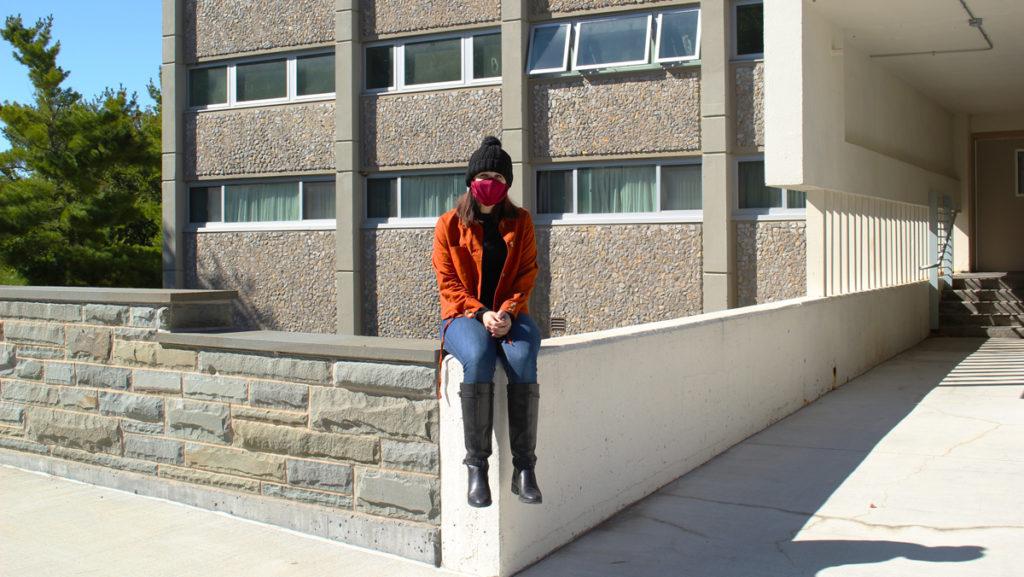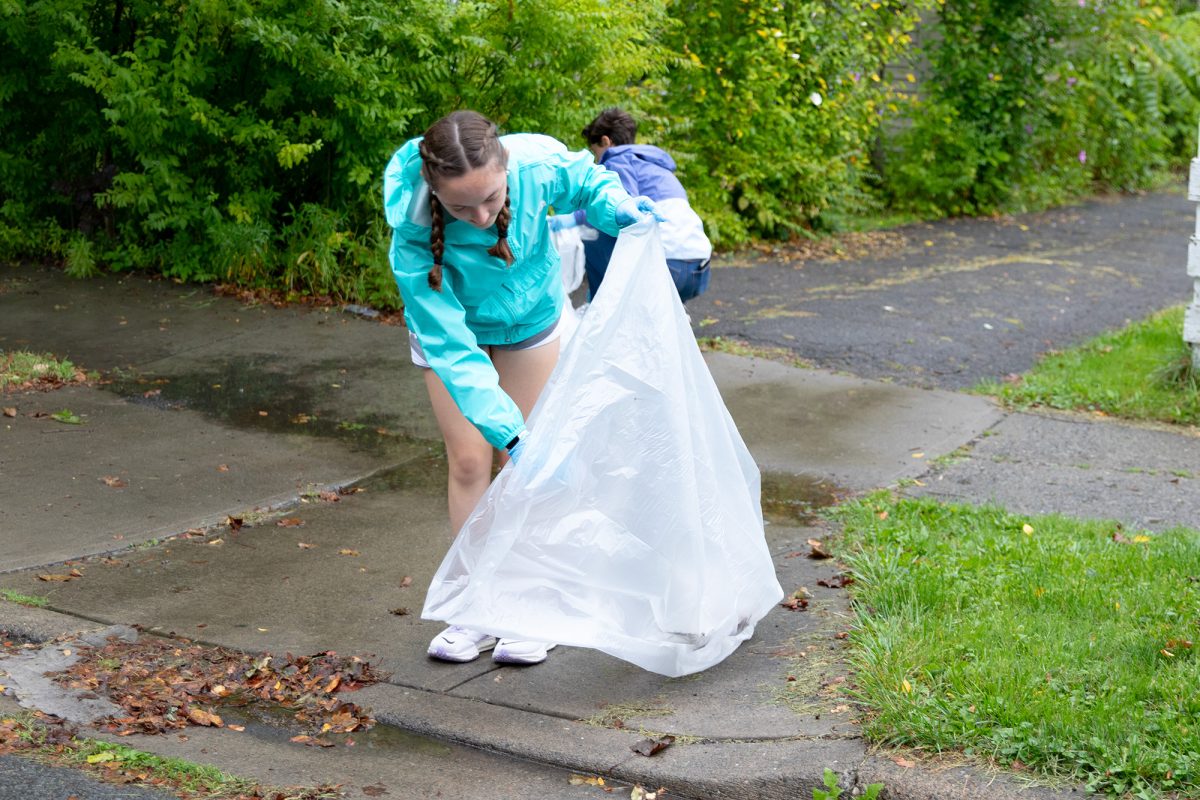The sounds of leaves rustling and birds outside are easy to hear when Ithaca College’s campus is not full of students’ voices as they pass between classes. Stepping out of the limited on-campus housing can feel lonely without the sight of staff and students walking around.
Some Ithaca College students with extenuating circumstances have been allowed to live on campus for Fall 2020, but some still feel isolated and lack in-person relationships because of social–distancing guidelines and online courses.
Students wanting to live on campus for the remote fall semester needed to fill out an exception form, provided by the college. Marsha Dawson, director of the Office of Residential Life and the Office of Student Conduct and Community Standards, said that there are currently 135 students living on campus while there were only 75 students during the spring who qualified to remain on campus after the college went remote. Housing is limited to East and West towers, the Garden Apartments and the Circle Apartments. Students living in the apartment areas are living in their chosen areas from the spring selection process, Dawson said.
“The most different part [of this semester] is not having the same sense of community and closeness with peers,” sophomore Britain Hodgkins said. “The campus is very empty right now and it’s super isolating to be on Zoom all day.”
Not every student was accepted to live on campus. Students were encouraged to apply if they were facing housing or personal hardships, but housing was not guaranteed. Applications were reviewed by representatives from the Division of Student Affairs and Campus Life, the Office of Academic Affairs and the Office of Student Accessibility Services, according to the campus housing exception page. Jenny Pickett, assistant director of residential life, said students who were approved to stay on campus for Spring 2020, when classes shifted to remote instruction, did not have to reapply.
Senior Camille Wrege is currently living on campus in her Garden apartment with her roommate. Wrege said that she lived in the same apartment last academic year and was able to squat her apartment over the summer as she was anticipating returning to campus for a fully in-person semester. Students can squat on-campus apartments over the summer if all bed spaces are filled before the summer.
Wrege, an occupational therapy major, said that she has some lab classes that are held in person, so she said she needed to be in Ithaca this semester and being able to live on campus has helped. However, she said being on campus is not perfect.
“It’s been kind of isolating,” Wrege said. “We can’t really go anywhere because there’s not many places that are open and we can’t have people over to the apartment.”
Isolation and loneliness have increased because of the COVID-19 pandemic. Social isolation can lead to a decline in physical and mental health as people do not get to interact with others. According to the United States Census Bureau, the percentage of Americans living alone was increasing even before the pandemic. The college’s Center for Counseling and Psychological Services is offering telehealth appointments for students at no cost.
Although residential life has changed because of the pandemic, some students on campus have said that there are changes that other facilities have undergone.
The Campus Center and the campus Ithaca Bakery are both open. For the Campus Center, students were given a green to-go box and two carabiners upon their arrival to campus. Every time they go to the dining hall, they exchange the used one for a new container with their meal ready to go inside.
“We go in, get food and leave to eat elsewhere,” Hodgkins said.
Reginald Briggs, associate director for Dining Services, said this semester has been difficult at times for Dining Services as well as the students.
“We feel bad for the students and are upset that we can’t provide the hospitality that we’d like,” said Briggs. “We are trying to do our best with this new set up.”
The Ithaca Bakery is also open Monday through Friday for walk-in orders and is now available on GrubHub. Briggs said GrubHub will also soon include the college’s food court options, even though it is not open right now.
Briggs said that there are tables open in IC Square, but social–distancing guidelines are in place.
One of the campus facilities decided to change up its routine and has gone mobile. The mail center delivers students’ mail daily to locations throughout the college’s campus.
Hodgkins said that there is a limited number of people allowed in every building. Both students said they are not allowed to have visitors in their rooms either and have to adhere to the Community Agreement.
Part of the Community Agreement is the daily screening and, for students living on campus, a weekly COVID-19 test. If students do not submit the daily screening, they are not allowed to access any part of campus. There have been 1,057 tests administered to students living on campus as of Nov. 5.
Wrege said that every week she gets an email reminding her to sign up for a COVID-19 test the following week. She said she and her roommate get tested every Tuesday and usually the next day they get an email with their results.
Junior Selina Ali, also an occupational therapy major, said that one of the most difficult things for her has been the weekly COVID-19 testing. Ali said she lives in the Circle Apartments, which are far from the Athletics and Events Center.
“It is very hard for me to get transportation sometimes,” she said. “Other than that, another difficulty of mine is taking the COVID test once a week. I have a dry nose, so sometimes my nose will bleed after taking the test.”
While adjusting to the new guidelines and rules on campus, students are also managing the workload that comes with online courses.
At this time, the Ithaca College Library is not open for students to do work, although the staff is available online. The library’s online databases are still open for use. Academic buildings have restricted access and are available for the students enrolled in in-person classes.
Aside from walking to the testing site, Ali is rarely on campus unless she needs to use the printing facilities in the Center for Health Sciences because the library is not open for printing.
Hodgkins said that the workload that accompanies Zoom can be overwhelming at times and there are social aspects that Zoom lacks.
“It’s a lot more difficult to make friends in your classes if you’re not sitting near them and hanging out before or after class,” Hodgkins said. “I’m hoping to have more socially distanced hangouts soon, but right now I’ve been keeping to myself just in case.”
Samm Swarts, residence director for Emerson Hall and the Garden Apartments, said that resident assistants (RAs) are engaging with students mainly through a virtual setting. Every week, the RAs do at least one engaging activity or event for on–campus students.
“We have also been lucky enough to do some in-person programming as well,” said Swarts.
Ali said she is spending time with her housemates but is keeping overall socialization to a minimum. Ali said that IC Unbound Dance Company was a fun way to socialize and be with friends on campus. With the semester being held remotely, clubs are much different.
“Sometimes for fun, I will dance in my living room, which is kind of set up like a studio, in hope that one day I’ll be able to dance again with my company friends,” Ali said.








